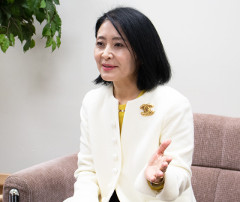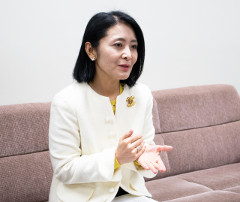Is stock investment good as long as it is profitable?

It is said that compared to the U.S. and European countries, Japan has a very small number of individual investors. According to a survey previously conducted by the Cabinet Office, those who want to invest in stocks account for 11.4% of all respondents, while those with no intention to do so accounted for 82.7%.
33.3% of those who have no intention to invest in stocks cited “having no knowledge of stock investment” as the reason, while 32.5% cited the “risk of loss.”
By contrast, 49.4% of those who want to invest in stocks cited “profits expected from stock price increases” as the reason, while 37.1% cited “expected income from dividends.”
Put plainly, the vast majority of Japanese shy away from stock investment because, although it may bring them profits from stock price increase and income from dividends, they either do not know much about it, or because it entails a risk of loss.
What they think about stock investment is certainly right, but in fact, investors around the world have begun to consider that stock investment is not just for profit. I believe that once you get to know this global trend, your negative attitude towards stock investment will change.
It goes without saying that investors invest in stocks in order to make profits. Accordingly, if they think that there is a good chance to make profits, they actively buy and sell stocks even in a short period of time.
At present, more than half of transactions (trading value basis) on the Tokyo Stock Exchange are executed through a High Frequency Trading (HFT) system which, utilizing AI technology, has the ability to execute massive volumes of trades in extremely short time intervals measured in milliseconds (one thousandth of a second).
In addition, as a company is owned by its shareholders under capitalism, some companies, in order to meet dividend demand from shareholders, i.e. investors, not only distribute regular profits, but also use internal reserves to pay dividends.
Furthermore, in some cases, an investor who has become the majority shareholder sends a manager to the relevant company, and the manager implements cost reduction initiatives there, selling the company’s assets and lands, and paying the profits earned from such actions back to the investor. These are measures taken by so-called vulture funds.
If this happens, it becomes impossible to operate the company in a stable manner; employees will get laid off, or be hurt by stagnant wages.
Not until the collapse of Lehman Brothers did people begin to turn a critical eye on such investments made in pursuit of these kinds of short-term returns alone. Seeing real economies badly affected by short-term investments, an increasing number of investors have begun to move away from the shareholder value principle.
As a matter of fact, these investment moves began as early as 1989, 20 years before the Lehman Brothers bankruptcy, when an oil tanker was stranded on the Alaskan coast.
Socially Responsible Investment (SRI) with the stranding of a tanker as a trigger
In 1989, Exxon Mobil’s oil tanker, the Exxon Valdez, struck a reef in Alaska’s Prince William Sound, causing large amounts of crude oil to spill into the ocean. Scenes of the sea covered with black, viscous crude oil and oil-soaked birds and sea life were transmitted globally through the media.
The scenes propelled volunteers from all over the world to move there to join the oil disaster response. Pictures of those volunteers cleaning black oil-coated sea life with towels one by one, the only way to rescue them, were also transmitted globally.
Witnessing firsthand that an accident caused by a company could have an irreversible impact on the global environment, people campaigned for increased awareness of environmental issues and began to call for a type of business management that took the global environment into consideration.
In response to this call, some types of SRI trusts called eco funds and green funds have been created. In contrast to traditional investment trusts which give first priority to companies with high profitability, these new funds chose companies that had not only high profitability, but that also engaged in eco-friendly activities as an investment destination.
In other words, stock investments were now considered transactions where investors not only demanded profit from the companies that they invested in, but also a sense of social responsibility.
This new trend also occurred in Japan, with Nikko Securities launching the Nikko Eco Fund in 1999. However, eco funds did not draw much attention in Japan because, for individual investors, it was difficult to buy investment trusts due to the sluggish stock market, and because investing in SRI trusts might have constituted a breach of fiduciary duty.
Meanwhile, the trend gained momentum around the world, and in 2006, the Principles for Responsible Investment (PRI) was launched by the United Nations (UN). As a result, awareness of the SDGs, or, the global goals to achieve a sustainable society, increased, and ESG investment, which focuses on E (environmental), S (social) and G (governance) when choosing companies as investment destinations, became the center of attention.
In the first place, European investors employed negative screening, where certain stocks were excluded from portfolios in cases where the companies were involved in the manufacture of tobacco, alcohol or weapons, because it was in conflict with Jewish and Christian values.
This negative screening strategy has been handed down to modern times in which a number of funds have been created. In 1928, Pioneer Fund, which avoided companies that manufactured alcohol or tobacco, was established in the U.S. The fact that the West has a long history of SRI has made a big difference between the attitude of Western investors and that of their Japanese counterparts.
It is important that we all take an interest in ESG investment

The attitude of Japanese investors changed in 2015 when the Government Pension Investment Fund (GPIF), a manager of public pension funds, signed up to the UN-supported PRI.
The world’s largest institutional investor, GPIF manages 150-160 trillion yen in assets, about half of which are invested in stocks.
The signing of the UN PRI by GPIF has had a substantial effect, as is witnessed by the fact that a number of other institutional investors in Japan followed suit. PRI signatories are required to incorporate ESG issues into their investment decision-making processes.
Specifically, institutional investors quantify each of the ESG factors based on information disclosed by, engagement with, and surveys on, companies.
For instance, they investigate: whether the company prepares environmental reports and whether these reports are of adequate quality when quantifying E factor; the percentage of women in managerial positions at the company and whether it promotes women’s participation and advancement in the workplace when quantifying S factor; and whether the company improves governance at the proposal of, and in response to, engagement by institutional investors when quantifying G factor.
In a nutshell, in addition to traditionally-used financial information, institutional investors have begun to use non-financial information, i.e. that on Corporate Social Responsibility (CSR), when making investment decisions.
This trend reflects the fact that abandoning the traditional shareholder value principle, an increasing number of investors have begun to believe that the purpose of business is not just to make a profit, but also to make everyone rich and happy by taking care of both people and society, and that they should pour money in the form of investment into businesses that are pursuing such goals.
Needless to say, corporate scandals remain rife even under these circumstances, and financial crises like the collapse of Lehman Brothers are likely to occur at any time triggered by short-term trading by investors. It is true that investors still continue investing based on the shareholder value principle.
Nevertheless, it is also true that ESG investing is growing from year to year. If this change makes both people and society happier, I believe that it will continue, and that it is up to each and every one of us to promote that change.
Although ESG factors independently quantified by institutional investors are not available to the public, there is a publisher who implements an ESG factor-based detailed survey covering a wide range of companies. This importantly includes the annual CSR rankings of these companies compiled using the data collected from the survey. This kind of information is useful for individual investors when making investment decisions.
Moreover, ESG-based funds have been created. It may be easier for individual investors to invest in such funds than in individual stocks.
It is important that you be interested in these investing trends without thinking that investment is none of your business. Then, in your daily shopping, you will be able to buy products manufactured by companies with high ESG ratings.
From early times, there has been a precept of Omi shonin (Omi merchants) in Japan known as “Sanpo yoshi” (literally meaning, good for three sides) which consists of “Urite yoshi” (good for the seller), “Kaite yoshi” (good for the buyer) and “Seken yoshi” (good for society). Likewise, in modern times, people have begun to think that it is very good if money is poured into businesses that will benefit all employees, customers, investors and society.
I call it “philanthropic finance.” Whether it is an absurd idea or not depends on how each of us thinks and act.
* The information contained herein is current as of Februry 2019.
* The contents of articles on Meiji.net are based on the personal ideas and opinions of the author and do not indicate the official opinion of Meiji University.
Information noted in the articles and videos, such as positions and affiliations, are current at the time of production.

